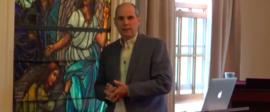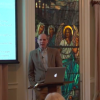Intro to Theology of Work Part 2: The Bad News (Video)
Video / Produced by TOW ProjectIn this video, New Testament scholar Sean McDonough gives the second part of his introduction to the Theology of Work, focusing on why work is difficult from Psalm 90, Genesis 3, and Ecclesiastes 1. This is part 1 of Jesus And Your Job, a video series on how Christians in different industries view their work. To find out more about this series and how you can use it as a small group study, go to the Jesus And Your Job homepage.
Intro to the Theology of Work Part 2: The Bad News
In the last video we talked about the promise and the blessing of work. Work is not only created by God in the beginning, but as we saw in Psalm 104, work is part of God’s ongoing creative purposes for the world. This week we turn to the other side of the equation: the effects of the fall on work. We’ll explore these in three categories: Finitude, Frustration, and Futility.

To put these together, I have a visual. Hootalinqua is a region in the Northwest territories of Canada, one of those places where virtually no one ever goes. Hootalinqua is a convergence of the blue waters of the Yukon river, and the brown muddy waters of the Teslin. That image, I want to suggest, is very helpful for thinking about our work. It’s not that work is just alright, a mixed bag in a world that is just kind of off on its own apart from God’s kingdom. No, work is both divinely beautiful and sinfully murky. We’ve got the beauty and joy of human labor that we talked about last week, symbolized by the blue waters of the Yukon, but in that same stream bed we’ve got the murky confused brown waters of the Teslin.
Onto the bad news: Finitude, Frustration, and Futility. What we’re going to see as we go through these concepts is an escalation or an intensification of the grim news. Finitude, the shortness of human life, is something that we might just accept as a bit unfortunate but not too bad. Frustration gets things a little ratcheted up. By the time we get to futility and “what’s the use?” we’re really at the end. At the same time, in the three passages we’re going to examine today, Finitude, Frustration and Futility flow in and out of one another.
Finitude
Lord, you have been our dwelling place
in all generations.
Before the mountains were brought forth,
or ever you had formed the earth and the world,
from everlasting to everlasting you are God.You turn us back to dust,
and say, “Turn back, you mortals.”
For a thousand years in your sight
are like yesterday when it is past,
or like a watch in the night.You sweep them away; they are like a dream,
like grass that is renewed in the morning;
in the morning it flourishes and is renewed;
in the evening it fades and withers.(Psalm 90:1-6)
Finitude, the brevity of life, isn’t explicitly connected to work at this point in the psalm. Nonetheless, the psalm is going to conclude with a specific word about human labor, “prosper the work of our hands” (Psalm 90:17). Work is very much on the psalmist’s mind as he thinks about the finitude, the shortness or the brevity of human life.
He rightly begins by extoling the infinite grandeur of the living god, that before the hills in order stood, God was there. The age of the world is meant to weigh heavily upon us as a way of beginning to grope towards God’s eternal nature and glory. But us? We are dust. And so what we do eventually crumbles away. We can’t accomplish all that we would want to accomplish. Our years just run out. Whatever we do, compared to what God has done in his eternal glory, is quickly going to fade into the dust along with ourselves.
At this point you can give a little sigh, but save your breath because you’re going to need some bigger sighs as we move forward.
Finitude, a fixed limit to one’s self and one’s work, is just part of being a created thing. We’re never going to match God’s infinity. And yet, in Psalm 90 we get the sense that something else isn’t right.
Frustration
For we are consumed by your anger;
by your wrath we are overwhelmed.
You have set our iniquities before you,
our secret sins in the light of your countenance.For all our days pass away under your wrath;
our years come to an end like a sigh.
The days of our life are seventy years,
or perhaps eighty, if we are strong;
even then their span is only toil and trouble;
they are soon gone, and we fly away.(Psalm 90:7-10)
Even if the limits placed on us make perfect sense, given that we’re created beings and not God, something else is not right. We are consumed by God’s anger (Psalm 90:7). Well, we certainly know where to turn to discover part of the reason why things aren’t right: the narrative of the fall in Genesis 3.
I’m trusting you know the wiles of the serpent, both from the text and firsthand. Not disparaging anybody, that’s true of all of us. The fall is a well-known story, but we want to pick out here the curse on the ground:
Because you have listened to the voice of your wife, and have eaten of the tree about which I commanded you, ‘You shall not eat of it,’ cursed is the ground because of you; in toil you shall eat of it all the days of your life; thorns and thistles it shall bring forth for you; and you shall eat the plants of the field. (Genesis 3:17)
What is exactly going on here? You’ll remember that last week we talked about the wildness of the world. Wildness is part of God’s good ordering of creation. It was meant to be subdued through human ingenuity, presumably fueled by the guidance of the Holy Spirit. This wildness, a certain degree of resistance that humans would need to be overcome, was part of the original plan. I think Eden itself, the garden of delights as scripture calls it, may have been a little easier to manage. But still, they were meant to go out into a world which was still wild but was still good in its wildness. We’ve got to balance the sense that a certain degree of resistance from the natural world was to be expected, against this statement that the ground is cursed with thorns and thistles, mosquitos and the rest.
If you look at things that way, then you don’t necessarily have to say that the curse consists of a disruption with the natural order. I admit that’s a possibility – you could have Eden created a certain way, and then because of the curse God gets right into the middle of things makes it completely different. On the other hand, I think it’s still acceptable biblically to imagine that the world is what it always was, but our experience of the environment is what’s cursed because of our dislocation from God. Things that we would have been able to overcome, now become insuperable obstacles.
The key thing is, however that situation arose, we know it’s the situation we’re in. Our labor is under the curse. Our purposes are forever frustrated by the situation arising from the fall. This occurs in two ways. The first is explicit in the text: we face problems with the natural world. The second is implicit in the text: the worst things about our work really lie hidden here in the initial response to God.
They heard the sound of the Lord God walking in the garden at the time of the evening breeze, and the man and his wife hid themselves from the presence of the Lord God among the trees of the garden. But the Lord God called to the man and said to him, “Where are you?” He said, “I heard the sound of you in the garden, and I was afraid, because I was naked; and I hid myself.” He said, “Who told you that you were naked? Have you eaten from the tree of which I commanded you not to eat?” The man said, “The woman whom you gave to be with me, she gave me fruit from the tree, and I ate.”
Genesis 3:8-12
It’s the disruption of relationships that causes the most trouble in our work. In the relationship between God and humanity, now we’re running away from God, trying to get as far away as we can, even though God’s the only one who can help us have productive labor. Then there’s the estrangement between people. God gives Eve as a good gift to Adam, and the first thing he does when things go awry is to blame her.
God is there in his grace. He comes to speak with them, he clothes them, and he gives them a home, albeit one east of Eden. Those are all signs of God’s ongoing grace. But even though God is there in his grace, this disruption really messes up our work.
Of all the sins that beset the workplace, that bring frustration in our labor, I would want to highlight above all bad management. Part of the burden of the Genesis curse is this pervasive systemic problem. Not only your finitude, but the frustration you feel when things around you are going wrong. That’s the reality of the workplace. What makes it even more frustrating is that there are good days or good moments when you get this taste of what labor is meant to be like - good and fruitful and productive – and then literally the next day you go in and the new manager’s not talking to you.
Futility
Before we go to our third category, futility, I want to use an example of workplace violence as a transition. Abel kept flocks and Cain worked the soil. Cain was very angry, called Abel out into the field, their workplace, and killed him. (Genesis 4:1-8) Abel’s name sounds like the Hebrew word for breath, Hebel. He’s here today, he’s gone tomorrow. That frustration resulting from the fall now puts finitude in a new and negative light. What might have been a natural life span is now cut short well before its time. In Abel’s name the vaporousness of existence is given its first and arguably most poignant illustration.
The reason I introduce Abel’s name is because that’s how the book of Ecclesiastes begins. Hebel, Hebel. The words of the teacher, son of David: Meaningless, meaningless says the teacher. (Ecclesiastes 1:1)
Meaningless is not necessarily the best translation of Hebel. Let me explain why. In Ecclesiastes, meaningless might suggest that the teacher Solomon is like some beret-wearing, chain smoking French intellectual of the 1930s, saying, “Zer is no God, zer is no meaning or purpose to life. It’s just complete chaos. We smoke our cigarettes, we have our baguettes, we take a mistress, we enjoy ourselves. We drink some wine and then it’s over. Meaningless, meaningless.” That’s not what Solomon is going for here.
The writer of Ecclesiastes knows there’s a God in heaven who somehow orders things. Ultimately, he’s going to realize like Moses in Psalm 90 that God can indeed establish our work in certain respects. But he is taking a sober look at the finitude of life, and ultimately looking at how things unfold. So Hebel isn’t meaninglessness in the strict intellectual sense of modern atheism. It’s this sense of fleetingness. And vanity is a pretty good way of capturing that, as in the old King James version, “vanity of vanities.”.
The Greek translation of the Old Testament gives a word that can be translated “futility.” I think that’s a nice idea to capture what Solomon’s getting at here: the transitory nature of life. The fact that our labors and our lives literally run into the ground gives a sense of futility to anybody who’s really paying attention.
Maybe God knows the ultimate answer. I think Solomon believes that, but from a human perspective sometimes you just feel like, What’s the point? In the book of Ecclesiastes, God is through Solomon allowing our experience of the world into the cannon of holy scripture. God acknowledges the way that we experience life in the world. The Bible is not simply God saying, “It’s going to be all right in the end, so stop whining.” God really does, even in his word, allow people to give voice to their finitude, frustration and even in sense of futility.
Notice Solomon’s very first example:
What do people gain from all the toil
at which they toil under the sun?
A generation goes, and a generation comes,
but the earth remains forever.
The sun rises and the sun goes down,
and hurries to the place where it rises.
The wind blows to the south,
and goes around to the north;
round and round goes the wind,
and on its circuits the wind returns.
All streams run to the sea,
but the sea is not full;
to the place where the streams flow,
there they continue to flow.
All things are wearisome;
more than one can express;
the eye is not satisfied with seeing,
or the ear filled with hearing.
What has been is what will be,
and what has been done is what will be done;
there is nothing new under the sun.Ecclesiastes 1:3-9
Our sense of futility, as we’ve seen now, is wrapped up in our finitude. We can take our limited existence not simply as a natural situation that arises in the presence of anything that’s not God, but rather as a curse that frustrates us. This leads to a feeling of futility. It’s not simply a frustration that can be overcome, but at the end of the day something that leaves us shrugging our shoulders with Solomon and saying, What’s the point?
Yes, there is a theological answer – the point is that ultimately God works out his purposes. He will “prosper the work of our hands” (Psalm 90:17). That should give us a hope and a prayer that what we do can matter. But it doesn’t take away the reality of our experience of frustration and futility. That’s not a sign of absolute lack of faith or disobedience. It’s a sign of what it is to live in a broken world.
Discussion Questions:
- Psalm 90 highlights human powerlessness in the face of God’s power, yet it concludes with a hopeful prayer for human labor: “prosper the work of our hands.” Think of the work you do each day. Do you rely on God to make your work prosper?
- Does the curse in Genesis 3 impact your work today?
- How does your work bring you into contact with feelings of finitude, frustration, and futility?











